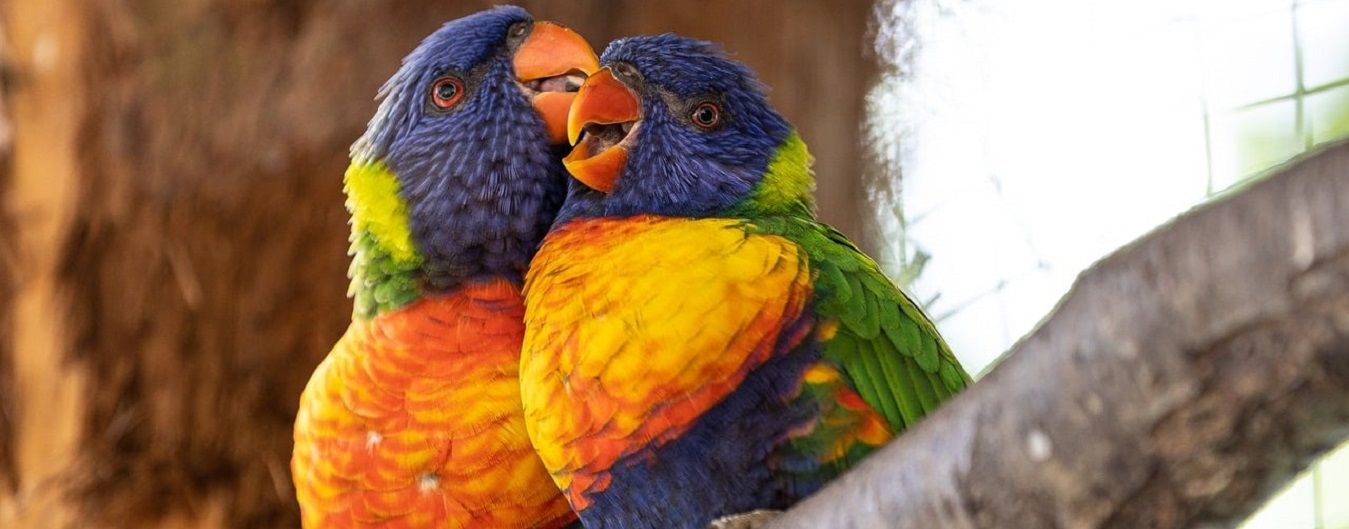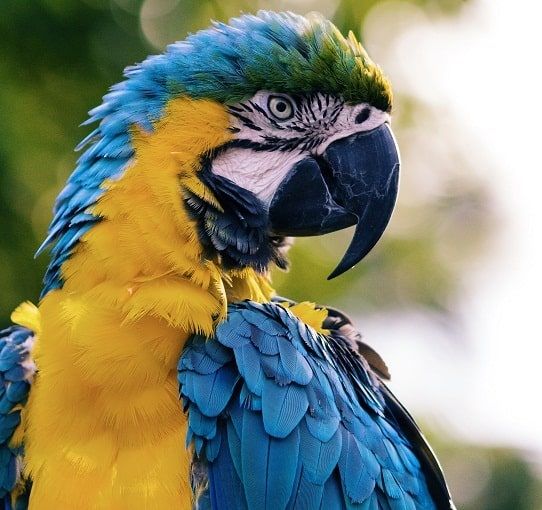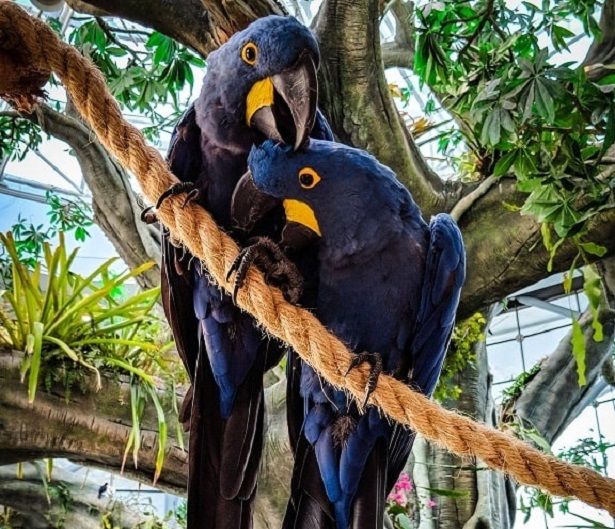

Birds should be housed in the largest cage possible. Cages should be made of non-toxic material eg stainless steel or powder coated. The cage bars should be spaced appropriately to the size of the bird to prevent escape. Ideally, perches should be made of natural wood (manzanita, northern hardwood, Australian pine, eucalyptus, etc.) that is pesticide-free. Branches found outside should not be made into perches, as they can carry fungus, bacteria, parasites, and pesticides. Another great choice of perches are soft braided rope perches. At least one perch should be placed near the food and water bowls. The depth and size of the bowls depends on the species.
Spoiled food should be removed every day from the cage, and the cage should be cleaned out completely at least once a week. Newspaper, paper towel, and other plain paper are ideal on the bottom of the cage to enable visualization of bird’s droppings. Wood shavings, corncob, cat litter, or other particle matter bedding is not recommended, because it tends to be dusty and grow bacteria and fungus.

Birds are very social and in the wild will live in large flocks. Birds usually enjoy human interaction. As the bird’s owner, you are essentially his or her flock mate, so the bird’s cage should be placed in an area of your home where there is a lot of activity. Cages should not be placed in the kitchen because of potential risk to the bird from cooking fumes and flames on the stove. Teflon pans should never be used around birds, because the toxic chemicals they release into the air when they are heated to high temperatures can be instantly fatal to birds. Birds should never be exposed to cigarette smoke or other aerosolized toxins to which they are very sensitive. Caution should also be taken with birds around open doors and windows, near mirrors and ceiling fans, and around other potentially predatory pets such as cats and dogs.
While birds should be taken out of the cage as much as possible to socialize them and provide exercise, they should never be left unsupervised. To provide mental stimulation and physical exercise, birds should be provided with safe toys that are good to chew on such as items made from soft wood, cardboard, paper, or chewable items such as coconut husks and corncobs. Daily behavioral training and maintaining a routine of interactions is also very important for confidence building and creating a healthy human-pet bird relationship. Games and learning commands help mental stimulation and bonding. Proper handling when your bird is young sets them up for a lifetime of good behavior and a friendly disposition. But what if you are scared of your bird? Don’t worry, our bird veterinarians can help you with that, too!
Your bird’s diet is critical to its overall health. Several commercially-prepared, formulated diets (pellets) are available, depending on your bird’s species, that should make up a good portion (generally at least two-thirds) of the diet. Supplementation with small amounts of vitamin A-rich fruits and vegetables also may provide nutrients essential in your bird’s diet and may make eating more fun for your bird. However, its important to note that avocados are toxic. For most birds, seeds should only make up a small portion of their diet. Our avian veterinarians can better provide you with information on the specific dietary needs of your bird.
Most temperatures that are comfortable for you is acceptable for your bird. It is best to avoid sudden changes in temperature as it may be difficult for birds to tolerate. Most tropical birds require added humidity from bathing or misting with water from a spray bottle for healthy feathers and skin.
It is best for birds not to be housed in air conditioning all the time. Birds need fresh air and sunlight (not filtered through glass) to make vitamin D in their skin. This is essential to the bird’s calcium and phosphorus balance. If unfiltered sunlight is not available, a bird can be provided with an indoor ultraviolet light for a few hours daily; UVA/UVB light is available for sale at our clinic.
Birds should be examined annually by an avian veterinarian to detect health problems early and prevent potential problems from developing. Nail trims and wing trims (to prevent escape or injury) are also recommended. Owners can learn to groom their birds at home or have these procedures performed by a veterinarian or other individual trained in bird grooming. Microchipping is recommended for pet birds to help locate a bird if it is lost in the future.
Thinking of an annual health check for your bird? Why not head down to the leading veterinary clinic for birds in Singapore? Schedule an appointment with us in just a click!
If your bird is ill, it will likely try to hide its sickness even from you. However, some subtle behavioral changes can indicate something is amiss. Bring your pet bird to us if you notice any of the following:
Birds can develop different health conditions throughout their lives. Below are several common conditions in birds:
Some female birds can lay eggs even without a male present and due to a multitude of reasons birds can become egg-bound. The condition occurs when your bird is unable to pass the egg naturally, and without treatment, it can be fatal
Birds in the wild eat a variety of foods including vegetation, nuts, seeds, berries, and insects. Unfortunately, in captivity, many birds are fed seeds exclusively, contributing to serious malnutrition and associated diseases. While pelleted diets can meet alot of your bird’s nutritional needs, we may offer other suggestions as needed to the diet complete.
Some birds voluntarily pull out their feathers from their body. It can occur due to an underlying medical issue, but often times, it is caused by boredom, improper diet, not receiving enough sunlight, lack of bathing for healthy skin or during the reproductive season. Feather picking can develop into a behavioral cycle and the underlying causes of feather picking can be so complex, getting it under control requires a multi-targeted approach with the help of your bird veterinarian.
